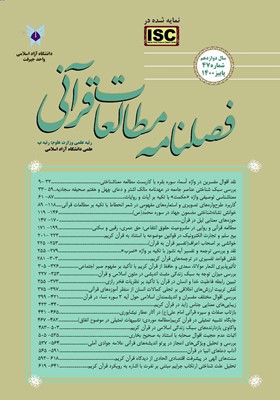آداب دعاهای انبیا در قرآن
محورهای موضوعی : فصلنامه مطالعات قرآنی
1 - استادیار و عضو مرکز تحقیقات گیاهان دارویی و کمیته تحقیقات طب اسلامی، دانشگاه علوم پزشکی شهرکرد، ایران
کلید واژه: آمرزش, رحمت, نیایش, ادعیه, معنویت,
چکیده مقاله :
دعا رابطه مستقیم انسان با خداست، خدا را صدا زدن و پاسخ شنیدن است. دست نیاز به سوی وی دراز کردن و از عالم غیب هدیه گرفتن است. دعا یک برنامه تربیتی و انسانساز است. توصیه میشود هر مسلمان و هر انسانی رو به سوی خدا داشته باشد و دل به اجابت ببندد و از رحمت الهی دلسرد نگردد. دعا از یک نظر عملی عبادتی گرانبهاست که از آن به عنوان وسیله برآوردن خواستهها، سبب رسیدن به هدفها یاد شده است. دعا یگانه راه ارتباط بندگان به مبدأ بوده و تنها وسیلهای است که خدای متعال برای ارتباط با خود مقرر فرموده است، اگر این ارتباط و توجه به مبدأ نباشد، خدای منان عنایت خاصه خود را قطع خواهد فرمود. در این صورت، بندگان استعداد پذیرش این عنایت را از دست داده و مقتضای رحمت الهی را از کف میدهند. قرآن کریم این حالت را نوعی استکبار میداند آن هم از موجودی که هیچ حیثیتی جز حیثیت بندگی ندارد.
Prayer is man's direct relationship with God, it is calling God and hearing the answer. Prayer is asking God and receiving a gift from the unseen world. Prayer is an educational and human-made program. It is recommended that every Muslim and every human being turn to God and hope to be responded and not be discouraged by divine mercy. Prayer is a precious act of worship in a practical sense, which has been mentioned as a means of fulfilling desires, achieving goals. Prayer is the only way for the servants to communicate with the origin and it is the only means that God Almighty has determined for communication with Himself, if this communication and attention is not to the origin, God Almighty will cut off His special favor. In this case, the slaves lose the ability to accept this provision and lose the need for divine mercy. The Holy Qur'an considers this a kind of arrogance, even from a being who has no status other than the status of a slave.
کتابنامه
قرآن کریم.
انصاریان، حسین. بی تا، عرفان اسلامی(شرح جامع مصباح الشریعة و مفتاح الحقیقة)، ج6، چاپ اول، تهران: انتشارات عرفان.
انوری، حسن. 1381ش، فرهنگ بزرگ سخن، ج3، تهران: بی جا.
جوادی آملی، عبدالله. 1378ش، حکمت عبادات، چاپ دوم، قم: مرکز نشر اسراء.
حر عاملی، محمد بن حسن. 1409ق، وسایل الشیعة، بی جا: مؤسسه آل البیت.
راغب اصفهانی محمد. 1423ق، مفردات الفاظ القرآن، چاپ دوم، قم: انتشارات ذوی القربی.
زمخشری، محمود. 1407ق، الکشاف، بیروت: دار الکتب العربی.
سلیمانیان، خدامراد. 1377ش، دستان سبز نیایش، چاپ اول، قم: انتشارات زائر.
سید بن طاووس. 1385ش، ادب حضور، ترجمه محمد روحی، بی جا: انتشارات انصاری.
شازلی، سید بن قطب بن ابراهیم. 1402ق، فی ضلال القرآن، بیروت: دار الشرق.
طباطبایی، محمد حسین. بی تا، تفسیر المیزان، ترجمه سید محمد باقر موسوی همدانی، ج 15، قم: انتشارات اسلامی.
طوسی، محمد بن حسن. بی تا، التبیان فی تفسیر القرآن، بیروت: دار احیاء التراث العربی.
عروسی حویزی، عبدالعلی بن جمعه. 1415ق، تفسیر نور الثقلین، قم: اسماعیلیان.
قرشی، سید علی اکبر. 1412ق، قاموس قرآن، ج1، چاپ ششم، تهران: دار الکتب الاسلامیة.
قمی، عباس. 1375ش، مفاتیح الجنان، ترجمه الهی قشمهای، چاپ دوم، تهران: نشر محمد.
کلینی، محمد بن یعقوب. 1388ش، اصول کافی، ترجمه لطیف راشدی و سعید راشدی، ج2، چاپ اول، قم: اجود.
مترجمان. 1360ش، ترجمه تفسیر مجمع البیان، تهران: فراهانی.
معلوف، لویس. 1386ش، فرهنگ المنجد عربی به فارسی، ترجمه محمد بندر ریگی، ج1، چاپ ششم، تهران: ایران.
مکارم شیرازی، ناصر و دیگران. 1386ش، تفسیر نمونه، ج1، چاپ 51، تهران: دار الکتب الاسلامیة.
_||_The Holy Quran.
Ansarian, Hussein, no date, Islamic Sufism (Comprehensive Description of Sharia and the Key of Truth), Volume 6, First Edition, Tehran: Erfan Publications.
Anwari, Hassan 2002, Farhang Bozorg Sokhan, vol. 3, Tehran: Bi Ja.
Javadi Amoli, Abdullah 1999, The Wisdom of Worship, Second Edition, Qom: Asra Publishing Center. Hor Amoli, Muhammad bin Hassan. 1409 AH, Vasael Al-Shia, no place: Al-Bayt Institute.
Ragheb Isfahani Mohammad. 1423 AH, the contents of the words of the Qur'an, second edition, Qom: Zu al-Qorbi Publications.
Zamakhshari, Mahmoud 1407 AH, Al-Kashaf, Beirut: Dar Al-Kotob Al-Arabi.
Soleimanian, Khodamard, 1998, Dastane Sabze Niyayesh, first edition, Qom: Zaer poblications
Seyed Bin Tavous, 2006, Adab Hozur, translated by Mohammad Rouhi, no place: Ansari Publications.
Shazli, Sayyid ibn Qutb ibn Ibrahim. 1402 AH, Fi Zalal Al-Qur'an, Beirut: Dar al-Sharq.
Tabatabai, Mohammad Hussain, no date, Tafsir Al-Mizan, translated by Seyyed Mohammad Baqir Mousavi Hamedani, vol. 15, Qom: Islamic Publications.
Tusi, Muhammad ibn Hassan, no date, Al-Tibyan Fi Tafsir Al-Quran, Beirut: Dar Al-Ahya Al-Tarath Al-Arabi.
Arusi Hoveizi, Abdul Ali bin Juma. 1415 AH, Tafsir Noor al-Thaqalin, Qom: Ismailian.
Qurashi, Seyed Ali Akbar 1412 AH, Quran Dictionary, vol. 1, sixth edition, Tehran: Dar Al-Kotob Al-Islamiya.
Qomi, Abbas 1996, Mafatih Al-Jannan, Divine Translation of Qeshmahi, Second Edition, Tehran: Mohammad Publishing.
Kelini, Muhammad ibn Ya'qub 2009, Osul Kafi, translated by Latif Rashedi and Saeed Rashedi, Volume 2, First Edition, Qom: Ajoud.
Translators. 1981, translation of Tafsir Majma 'al-Bayan, Tehran: Farahani.
Ma'loof, Lewis. 2007, Farhang al-Munajjid Arabic to Persian, translated by Mohammad Bandar Rigi, vol. 1, sixth edition, Tehran: Iran.
Makarem Shirazi, Nasser and others. 2007, Sample Interpretation, Vol. 1, Edition 51, Tehran: Dar Al-Kotob Al-Islamiya

